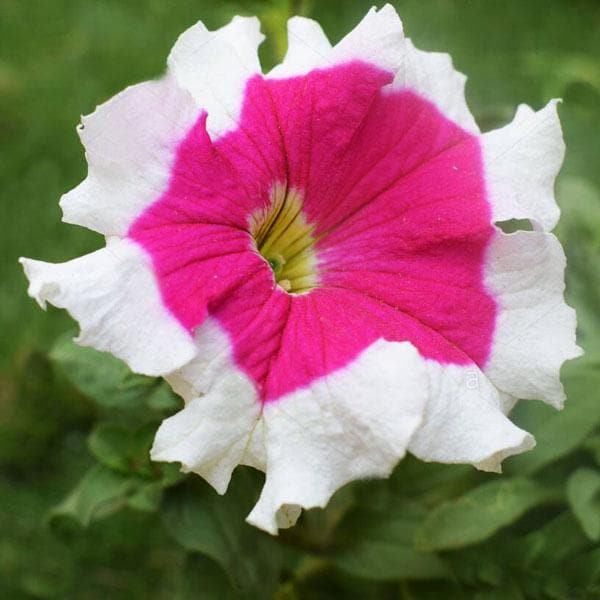
Petunia (Half Pink Half White) - Plant
(MRP Inclusive of all taxes)
- Shipping ₹79 for entire order
- Dispatch in 7 days
- Country of origin: India

(MRP Inclusive of all taxes)
 Save 17%
Save 17%
Petunia (Any Color) - Plant The Petunia is a vibrant and versatile flowering plant, cherished for its stunning blooms and rich colors. Available i...
View full details Save 29%
Save 29%
Petunia (Any Color) Plant in 5 inch (13 cm) Pot The Petunia plant, available in a vibrant array of colors, is a beloved choice for gardene...
View full details
 Save 30%
Save 30%
Beautiful Flowers of the Season Transform your garden or indoor space with our 'Beautiful Flowers of the Season' collection. This vibrant assortme...
View full details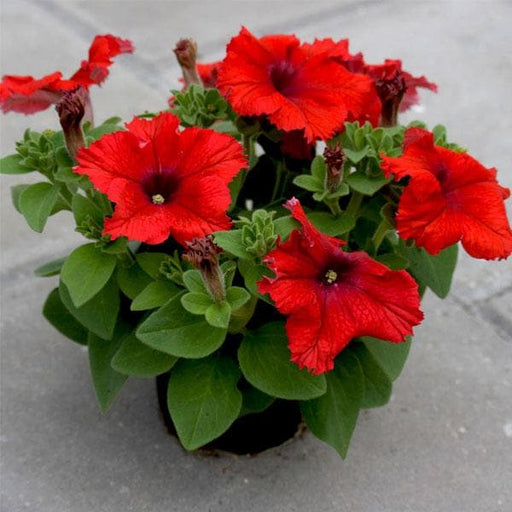 Sold out
Sold out
Petunia (Red) - Plant The vibrant red Petunia is a stunning addition to any garden or landscape. Known for its trumpet-shaped blooms, this...
View full details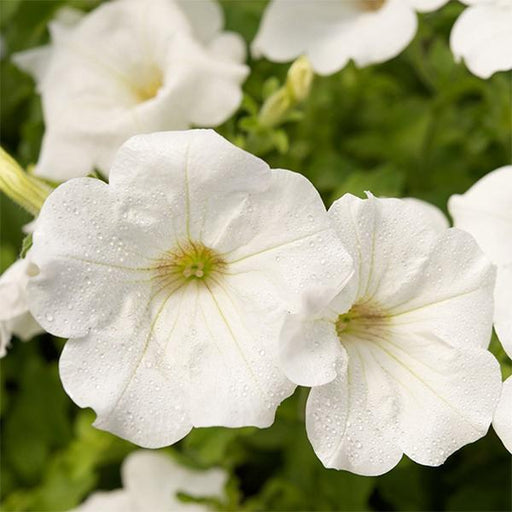 Sold out
Sold out
Petunia (White) - Plant The White Petunia is a stunning flowering plant known for its vibrant, pure white blooms that add elegance to any ...
View full details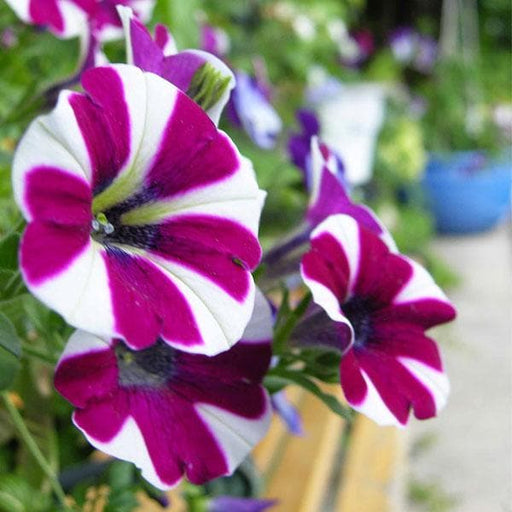 Sold out
Sold out
Petunia (Violet with White Strip) - Plant The Petunia (Violet with White Strip) is a stunning flowering plant that adds a vibrant touch to...
View full details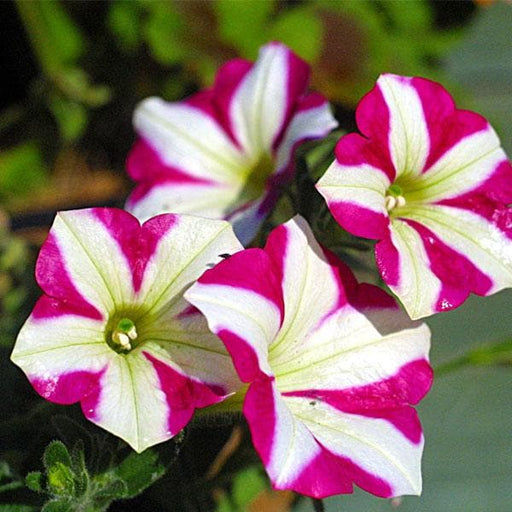 Sold out
Sold out
Petunia (Pink with White Strip) - Plant The Petunia (Pink with White Strip) is a stunning flowering plant that adds a vibrant touch to any...
View full details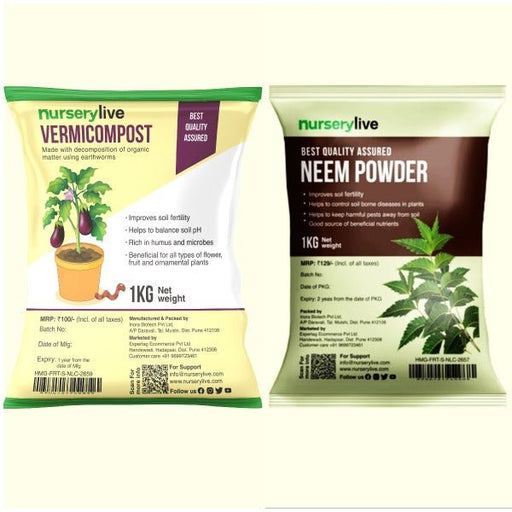 Save 15%
Save 15%
Pack of Vermicompost and Neem Cake for House Plants Transform your indoor garden with our premium Pack of Vermicompost and Neem Cake, spec...
View full details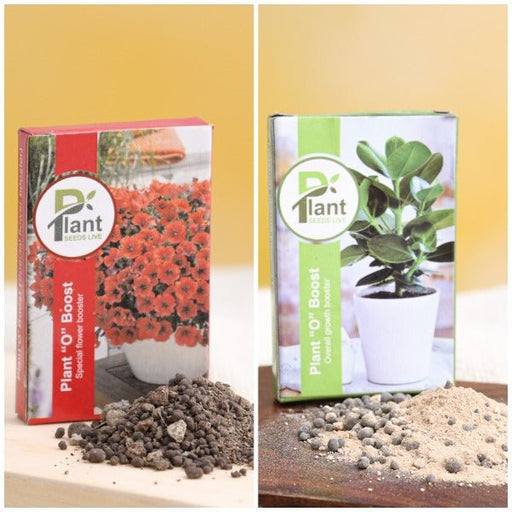
Pack of Plant Growth and Flower Boosters Unlock the full potential of your garden with our Pack of Plant Growth and Flower Boosters! This ...
View full details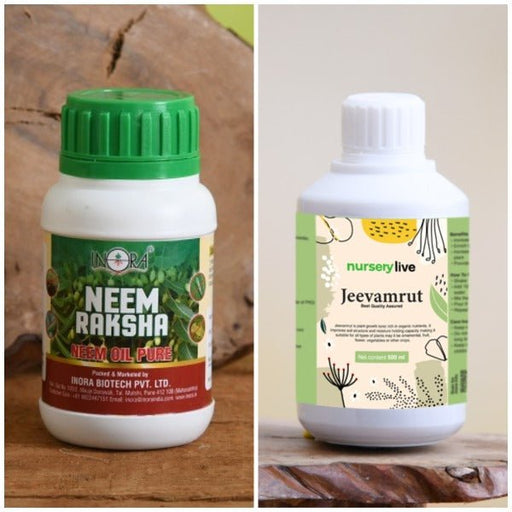 Save 38%
Save 38%
Combo of Jeevamrut and Neem Raksha for Easy Growth and Protection of Houseplants Transform your indoor garden with our exclusive combo of ...
View full details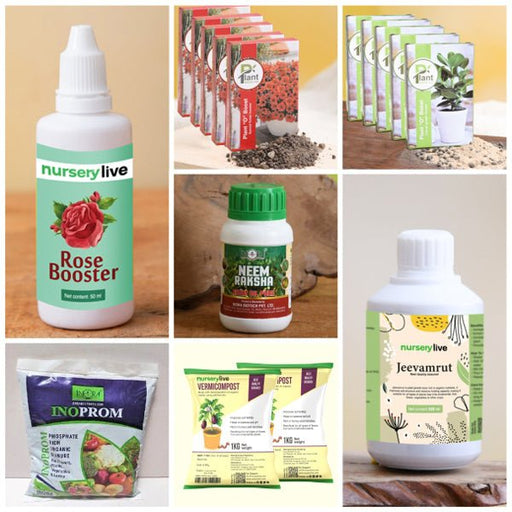 Save 22%
Save 22%
Plant Nutrients Kit (Pack of 16) for a Healthy Garden Transform your garden into a lush paradise with our Plant Nutrients Kit, featuring 1...
View full details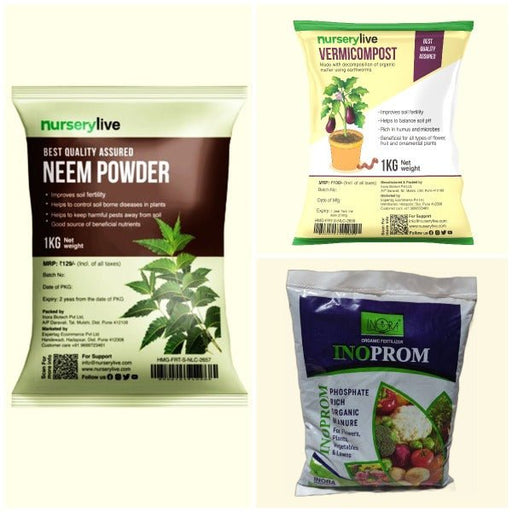 Save 16%
Save 16%
Combo of Top Plant Fertilizers Elevate your gardening game with our exclusive Combo of Top Plant Fertilizers, featuring two bags of premiu...
View full details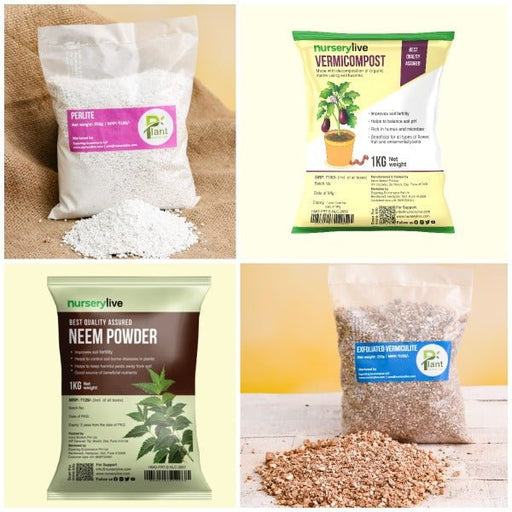 Save 24%
Save 24%
Pack of 4 Additives to Make Soil Healthy and Nutrient Rich Transform your garden into a thriving ecosystem with our Pack of 4 Additives de...
View full details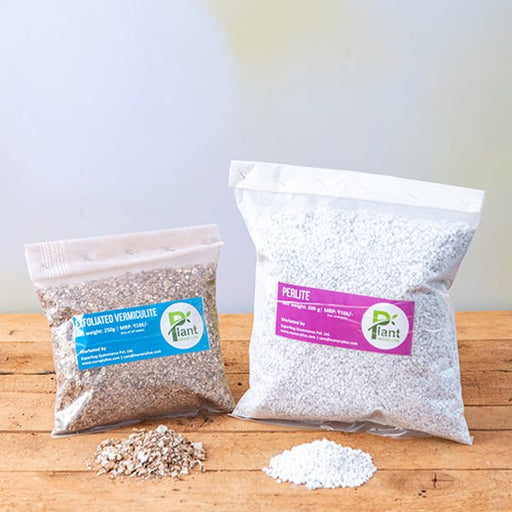 Save 30%
Save 30%
Transform your gardening experience with our premium Combo of Perlite and Vermiculite. This unique blend is designed to enhance soil aeration and ...
View full details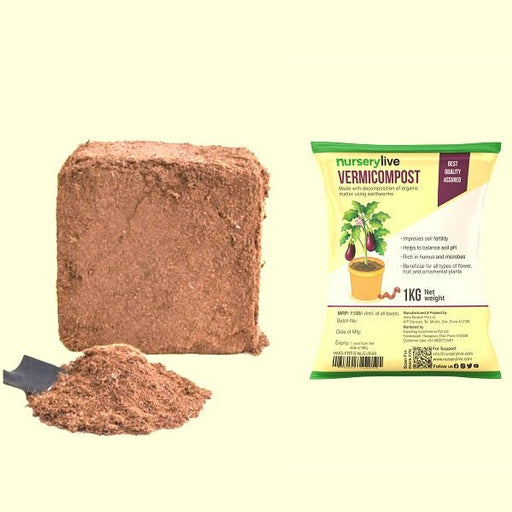 Save 27%
Save 27%
Combo of 2 Vermicompost and Cocopeat - Enrich Your Soil Naturally! Transform your garden into a thriving ecosystem with our Combo of 2 Ver...
View full details
 Save 35%
Save 35%
Best 6 Plants for Perfect Indoor Garden Transform your living space into a lush oasis with our curated collection of the Best 6 Plants for a...
View full details
 Save up to 50%
Save up to 50%
Mini Succulent Garden Pack Transform your space with our Mini Succulent Garden Pack, featuring a delightful collection of 4 any variety beautiful s...
View full details
 Save 30%
Save 30%
5 Best Fragrant Plants Transform your garden or indoor space into a fragrant paradise with our curated selection of the 5 Best Fragrant Plants. Th...
View full details
 Save 24%
Save 24%
Set of 2 Bonsai Looking Grafted Adeniums Transform your indoor or outdoor space with our exquisite Set of 2 Bonsai Looking Grafted Adenium...
View full details Save 45%
Save 45%
Top 4 Die Hard Succulents Pack Transform your indoor or outdoor space with our Top 4 Die Hard Succulents Pack, featuring a curated selecti...
View full details
 Save 30%
Save 30%
5 Best Indoor Plants Pack Transform your living space into a lush oasis with our '5 Best Indoor Plants Pack.' This carefully curated collection fe...
View full details
 Save 25%
Save 25%
Set of 4 Evergreen Air Purifier Plant Pack Transform your indoor space into a lush, green oasis with our Set of 4 Evergreen Air Purifier Pla...
View full details| SrNo | Item Name | Qty |
|---|---|---|
| 1 | Petunia (Half Pink Half White) Plant in 6 inch (15 cm) Pot | 1 |
The stunning Petunia (Half Pink Half White) is a captivating addition to any garden or indoor space. Known for its unique bi-color petals, this plant showcases a beautiful blend of soft pink and pristine white, creating a striking visual appeal. Petunias are beloved for their vibrant colors and long-lasting blooms, making them a favorite among gardeners and floral enthusiasts alike.
What sets this particular variety apart is its eye-catching color combination, which symbolizes harmony and balance. The Half Pink Half White Petunia not only enhances the aesthetic of your garden but also attracts pollinators, contributing positively to the ecosystem. With its resilience and adaptability, this plant thrives in various conditions, making it a perfect choice for both novice and experienced gardeners.
Special features of the Half Pink Half White Petunia include its ability to bloom continuously throughout the growing season, providing a burst of color from spring to fall. Additionally, this variety is known for its fragrant flowers, which can fill your garden with a delightful scent, enhancing your outdoor experience.
By planting Petunias, you contribute to a healthier ecosystem. These flowers attract beneficial insects, support pollination, and can help improve soil health. Their vibrant blooms also provide essential habitats for various wildlife, promoting biodiversity in your garden.
If you think petunias are just pretty faces, think again! These floral divas require a bit of pampering to thrive. Water them regularly, but don’t drown them—think of them as your high-maintenance friend who loves a spa day but hates being soaked. Fertilize them every few weeks to keep their colors vibrant, and deadhead those spent blooms like a pro to encourage new growth. Remember, a happy petunia is a blooming petunia!
Talk about a floral fashion statement! The half pink, half white petunia is the trendsetter of the garden world. With its striking color combination, it’s like the flower equivalent of a stylish tuxedo. These beauties can add a touch of elegance to any garden or patio, making them the perfect choice for those who want to impress their neighbors without breaking a sweat.
Ready to get your hands dirty? Planting petunias is as easy as pie—if pie were made of soil and sunshine! Choose a sunny spot in your garden, dig a hole, and pop those petunia babies in. Make sure to space them out like they’re at a party, giving each one room to shine. Water them in, and voilà! You’ve just created a floral masterpiece that will have everyone asking for your gardening secrets.
Petunias are picky about their soil, but who isn’t? They prefer well-draining soil that’s rich in organic matter. Think of it as their five-star hotel—no one wants to stay in a soggy mess! A mix of potting soil and compost will do the trick. Just remember, if your petunias start looking droopy, it might be time to check their soil situation. They’re not shy about letting you know when they’re unhappy!
Sunlight is the secret ingredient to a petunia’s happiness. These flowers are sun worshippers, craving at least six hours of direct sunlight each day. If you place them in a shady spot, they’ll sulk like a teenager denied their phone. So, give them the sun they crave, and watch them bloom into the vibrant beauties they were born to be!
Watering petunias is an art form. Too little, and they’ll wilt like a sad balloon; too much, and they’ll drown in their own drama. Aim for a balance—water them deeply but infrequently, allowing the soil to dry out between waterings. Think of it as giving them a refreshing drink after a long day, but don’t turn on the fire hose! Your petunias will thank you with a burst of color.
Every garden has its villains, and petunias are no exception. Aphids, spider mites, and slugs can wreak havoc on your floral friends. But fear not! A little neem oil or insecticidal soap can send those pests packing. Just remember to check your plants regularly—like a superhero on patrol—so you can catch any trouble before it escalates into a full-blown garden crisis.
If you want your petunias to strut their stuff, a little fertilization goes a long way. Use a balanced, water-soluble fertilizer every few weeks during the growing season. It’s like giving them a protein shake before a big workout! Just be careful not to overdo it; too much fertilizer can lead to lush foliage at the expense of blooms. Keep it balanced, and your petunias will be the talk of the garden!
Want to multiply your petunia power? Propagation is the way to go! You can take cuttings from healthy plants and root them in water or soil. It’s like cloning your favorite flower without the sci-fi drama. Just make sure to keep the cuttings moist and in a warm spot, and soon you’ll have a whole army of half pink, half white petunias ready to take over your garden!
Pairing petunias with the right companions can elevate your garden game. Think of them as the social butterflies of the plant world. Marigolds, geraniums, and lobelia make excellent companions, creating a colorful tapestry that will have your garden looking like a floral runway. Just avoid planting them with overly aggressive plants that might overshadow their beauty—no one likes a garden bully!
Petunias are the life of the party in spring and summer, but they need a little TLC as the seasons change. As temperatures drop, consider bringing potted petunias indoors or covering them with frost cloth. They may sulk a bit, but with the right care, they’ll be back to their vibrant selves when the sun returns. Think of it as a seasonal spa retreat for your flowers!
A Petunia (Half Pink Half White) is a stunning flower that flaunts a delightful mix of pink and white petals. It’s like a floral fashion statement, perfect for adding a splash of color to your garden or patio. These beauties are not just pretty faces; they’re also easy to care for, making them a gardener’s best friend.
Caring for your Petunia is as easy as pie! Just give it plenty of sunlight, well-draining soil, and regular watering. Avoid soggy feet, though; these flowers prefer to be a little dry between drinks. A sprinkle of fertilizer every few weeks will keep them blooming like they’re on a perpetual vacation!
Petunias are the party animals of the plant world, blooming from spring until the first frost. They love to show off their colors, so expect a vibrant display all season long. Just think of them as the life of the garden party, always ready to impress with their half pink, half white charm!
Absolutely! Petunias are pot perfectionists. They thrive in containers, making them ideal for balconies, patios, or any small space craving a pop of color. Just ensure your pot has drainage holes, and you’ll have a blooming beauty that’s easy to move around for maximum sun exposure and compliments!
Petunias prefer a well-draining soil mix that’s rich in organic matter. Think of it as their five-star hotel! A mix of potting soil and compost will keep them happy and healthy. Avoid heavy clay or soggy soils; these flowers are not fans of mud baths, no matter how trendy they may seem!
Water your Petunia when the top inch of soil feels dry. They like a good drink but despise being waterlogged. Aim for a balance—think of it as a spa day for your plant. A little hydration goes a long way in keeping those pink and white petals looking fabulous!
Like any diva, Petunias can attract a few unwanted guests, such as aphids and spider mites. But fear not! A little neem oil or insecticidal soap can send those pests packing. Keep an eye on your floral superstar, and you’ll ensure they stay pest-free and ready to shine in your garden!
Yes, you can! Propagating Petunias is as easy as pie. Simply take cuttings from healthy stems, let them root in water or soil, and voilà! You’ll have new plants to share or keep for yourself. It’s like cloning your favorite flower—just without the mad scientist vibes!
Petunias are the annuals that live life to the fullest! They bloom beautifully for one season and then bid adieu when the frost arrives. But don’t worry; you can always replant them next year for another round of stunning blooms. Think of them as seasonal stars that return for an encore!
Petunias thrive in full sun, so give them at least six hours of sunlight daily. They love warm temperatures and well-draining soil. A little breeze is nice, but avoid harsh winds that could mess up their hair. With the right conditions, your Petunia will be the belle of the botanical ball!
Sadly, Petunias are not winter warriors. They can’t handle frost and will perish in cold temperatures. If you want to keep them around, consider bringing potted plants indoors or treating them as annuals. Just think of them as summer flirts—here for a good time, not a long time!